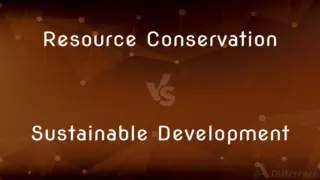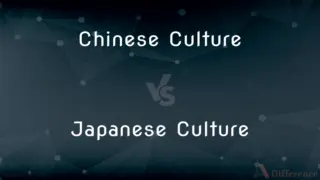Faraway vs. Far Away — What's the Difference?
By Tayyaba Rehman — Published on November 30, 2023
Faraway is an adjective describing something distant, while "far away" is an adverbial phrase indicating the distance between two things.

Difference Between Faraway and Far Away
Table of Contents
ADVERTISEMENT
Key Differences
Faraway, when used in sentences, acts as an adjective. It describes objects, places, or even feelings that seem distant or remote. On the other hand, "far away" is a two-word adverbial phrase which indicates how something is positioned in relation to something else.
For instance, if someone says, "She has a faraway look in her eyes," it describes a certain kind of expression that seems distant or dreamy. Alternatively, when someone says, "She lives far away," it indicates the physical distance of her residence from the speaker's location.
The word Faraway can often evoke a sense of dreaminess or mystique. For example, "faraway lands" brings forth an idea of mysterious or uncharted territories. "Far away" has a more literal sense, commonly highlighting spatial distance without necessarily carrying the same romantic or dreamy connotation.
Grammatically, it's important to ensure the appropriate choice between Faraway and "far away." Using Faraway as an adjective and "far away" as an adverbial phrase ensures that sentences retain their intended meaning and structure.
While both Faraway and "far away" touch upon the concept of distance, their applications in language differ. Faraway is more descriptive, whereas "far away" is more indicative of physical or emotional spacing.
ADVERTISEMENT
Comparison Chart
Part of Speech
Adjective
Adverbial Phrase
Typical Use
Describing nouns
Indicating distance
Example
Faraway lands
She lives far away
Emotional Connotation
Often dreamy or romantic
Typically neutral
Grammatical Structure
Used before nouns
Used after verbs
Compare with Definitions
Faraway
Romanticized or dreamy.
Tales of faraway lands always fascinated her.
Far Away
At a great distance.
The stars are far away from Earth.
Faraway
Removed or aloof.
His faraway demeanor made it hard to connect with him.
Far Away
Removed from a particular point.
Keep the chemicals far away from children.
Faraway
Unfamiliar or foreign.
The song had a faraway sound, evoking other cultures.
Far Away
Long ago in time.
It all happened far away in the past.
Faraway
Abstract or not immediately accessible.
He often seemed lost in faraway thoughts.
Far Away
Indicating separation or detachment.
Her hometown feels far away now.
Faraway
Distant in space or time.
The faraway mountains looked majestic.
Far Away
Not immediately nearby.
The nearest store is quite far away from here.
Faraway
Very distant; remote.
Faraway
Abstracted; dreamy
A faraway look.
Faraway
Distant.
She lived in a faraway village in a faraway land.
Faraway
Not mentally present, as when daydreaming.
There was a faraway look on his face.
Faraway
One who lives a great distance away.
Faraway
Very far away in space or time;
Faraway mountains
The faraway future
Troops landing on far-off shores
Far-off happier times
Faraway
Far removed mentally;
A faraway (or distant) look in her eyes
Common Curiosities
Is Faraway always about physical distance?
No, it can also describe emotional or abstract distances.
What part of speech is Faraway?
Faraway is an adjective.
Can Faraway and "far away" be used interchangeably?
Not always, since Faraway is descriptive and "far away" indicates distance.
How is "far away" typically used in sentences?
"Far away" is used as an adverbial phrase to indicate distance.
Is there a difference in emotion between Faraway and "far away"?
Faraway often has a dreamy connotation, while "far away" is generally neutral.
What's a common mistake when using Faraway or "far away"?
Using Faraway instead of "far away" after verbs, and vice versa.
Can "far away" describe time?
Yes, it can indicate something that happened a long time ago.
Is Faraway a formal word?
It's neutral and can be used in both formal and informal contexts.
Can "far away" be split in a sentence?
Typically, "far" and "away" are used together, but context might allow for separation in some cases.
Is Faraway commonly used in literature?
Yes, especially when evoking distant or romanticized settings.
What's a synonym for Faraway?
"Distant" can be a synonym for Faraway.
What's an example of Faraway describing an abstract idea?
"Faraway dreams" can describe intangible or unattained aspirations.
Can "far away" describe an emotional state?
Yes, like in "He felt far away from his emotions."
Are Faraway and "far away" antonyms of "close" or "near"?
Yes, both indicate a sense of distance, opposite to "close" or "near."
How can "far away" describe temporal distance?
By referring to events that happened long ago, like "a memory from far away."
Share Your Discovery

Previous Comparison
Resource Conservation vs. Sustainable Development
Next Comparison
Chinese Culture vs. Japanese CultureAuthor Spotlight
Written by
Tayyaba RehmanTayyaba Rehman is a distinguished writer, currently serving as a primary contributor to askdifference.com. As a researcher in semantics and etymology, Tayyaba's passion for the complexity of languages and their distinctions has found a perfect home on the platform. Tayyaba delves into the intricacies of language, distinguishing between commonly confused words and phrases, thereby providing clarity for readers worldwide.











































